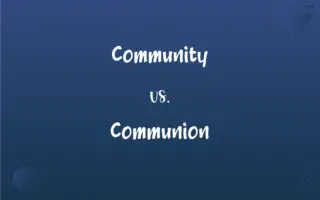Door vs. Hatch: What's the Difference?
By Aimie Carlson & Janet White || Updated on March 4, 2024
A door is a movable barrier used to close off an entrance to a space, such as a room or building, typically swinging on hinges or sliding. A hatch is a type of door that covers an opening in the floor, roof, or ceiling.

Key Differences
Doors are fundamental architectural elements found in nearly all types of buildings and vehicles, providing security, privacy, and control over the flow of air and light. They come in various styles, including panel, flush, and sliding, and are made from materials like wood, metal, glass, or composite. Hatches, on the other hand, are a specific kind of door designed to cover openings that are not in traditional walls but in floors, ceilings, or decks of ships and aircraft. Hatches are used for purposes such as accessing storage spaces, serving as entry points to different levels of a building or vehicle, and in emergency exits.
While both doors and hatches serve the purpose of covering openings, their applications and operational mechanisms often differ. Doors are primarily concerned with side-to-side access and privacy, fitting into vertical frames in walls. Hatches, however, are designed for vertical access, either upwards or downwards, and are more focused on utility and spatial efficiency, especially in environments where space is at a premium or where traditional doors are impractical.
In terms of installation and usage, doors are a more universal feature in architecture and daily life, found in homes, buildings, and various vehicles. Hatches, while also widespread, are more specialized and are often found in specific settings such as industrial sites, ships, submarines, aircraft, and certain types of buildings like storage facilities and attics.
The choice between a door and a hatch can depend on the architectural design, the need for space optimization, and the specific functional requirements of the building or vehicle. While doors emphasize ease of access and aesthetics, hatches prioritize efficient use of space and access to non-standard openings.
Door and Hatch Definitions
Door
Can be aesthetic and functional.
The glass doors added elegance to the office.
ADVERTISEMENT
Hatch
A covering for an opening in a floor or ceiling.
They opened the hatch to access the attic.
Door
Found in nearly all types of buildings.
The bathroom door was left slightly ajar.
Hatch
Common in marine and aviation settings.
The submarine hatch was securely bolted.
Door
A movable structure used to close off an entrance, typically consisting of a panel that swings on hinges or that slides or rotates.
Hatch
Might require lifting or sliding to open.
He lifted the hatch to check the storage below deck.
ADVERTISEMENT
Door
A similar part on a piece of furniture or a vehicle.
Hatch
An opening, as in the deck of a ship, in the roof or floor of a building, or in an aircraft.
Door
A doorway.
Hatch
The cover for such an opening.
Door
The room or building to which a door belongs:They live three doors down the hall.
Hatch
A hatchway.
Door
A means of approach or access:looking for the door to success.
Hatch
A door that opens upward on the rear of an automobile; a hatchback.
Door
(Slang)To strike (a passing bicyclist, for example) by suddenly opening a vehicular door.
Hatch
A floodgate.
Door
To serve as a doorman or doorwoman of (a nightclub, for example).
Hatch
The act or an instance of hatching from an egg or similar structure.
Door
A portal of entry into a building, room, or vehicle, typically consisting of a rigid plane movable on a hinge. Doors are frequently made of wood or metal. May have a handle to help open and close, a latch to hold the door closed, and a lock that ensures the door cannot be opened without the key.
I knocked on the vice president's door
Hatch
The act or an instance of emerging from a cocoon or chrysalis.
Door
Any flap, etc. that opens like a door.
The 24 doors in an Advent calendar
Hatch
The act or an instance of emerging from the water when transforming from an aquatic larval or pupal form to a winged form.
Door
(immigration) An entry point.
Hatch
A group of young organisms, especially birds, that hatch at one time; a brood.
Door
(figurative) A means of approach or access.
Learning is the door to wisdom.
Hatch
A group of adult insects that emerge at one time.
Door
(figurative) A possibility.
To leave the door open
All doors are open to somebody
Hatch
A group of winged insects, as mayflies or caddisflies, that emerge at one time from a body of water.
Door
(figurative) A barrier.
Keep a door on your anger.
Hatch
A fine line used in hatching.
Door
A software mechanism by which a user can interact with a program running remotely on a bulletin board system. See BBS door.
Hatch
To emerge from an egg or other structure that surrounds and protects an embryo.
Door
The proceeds from entrance fees and/or ticket sales at a venue such as a bar or nightclub, especially in relation to portion paid to the entertainers. "The bar owner gives each band a percentage of the door and charges customers more to get in"
Hatch
To emerge from a cocoon or chrysalis.
Door
To cause a collision by opening the door of a vehicle in front of an oncoming cyclist or pedestrian.
Hatch
To emerge from the water when transforming from an aquatic larval or pupal form to a winged form, as a mayfly or caddisfly.
Door
An opening in the wall of a house or of an apartment, by which to go in and out; an entrance way.
To the same end, men several paths may tread,As many doors into one temple lead.
Hatch
To produce (young) from an egg or eggs.
Door
The frame or barrier of boards, or other material, usually turning on hinges, by which an entrance way into a house or apartment is closed and opened.
At last he came unto an iron doorThat fast was locked.
Hatch
To cause (an egg or eggs) to produce young.
Door
Passage; means of approach or access.
I am the door; by me if any man enter in, he shall be saved.
Hatch
To devise or originate, especially in secret
Hatch an assassination plot.
Door
An entrance way, but taken in the sense of the house or apartment to which it leads.
Martin's office is now the second door in the street.
A riot unpunished is but next door to a tumult.
His imaginary title of fatherhood is out of doors.
If I have failed, the fault lies wholly at my door.
Hatch
To shade by drawing or etching fine parallel or crossed lines on.
Door
A swinging or sliding barrier that will close the entrance to a room or building or vehicle;
He knocked on the door
He slammed the door as he left
Hatch
A horizontal door in a floor or ceiling.
Door
The entrance (the space in a wall) through which you enter or leave a room or building; the space that a door can close;
He stuck his head in the doorway
Hatch
A trapdoor.
Door
Anything providing a means of access (or escape);
We closed the door to Haitian immigrants
Education is the door to success
Hatch
An opening in a wall at window height for the purpose of serving food or other items. A pass through.
The cook passed the dishes through the serving hatch.
Door
A structure where people live or work (usually ordered along a street or road);
The office next door
They live two doors up the street from us
Hatch
A small door in large mechanical structures and vehicles such as aircraft and spacecraft often provided for access for maintenance.
Door
A room that is entered via a door;
His office is the third door down the hall on the left
Hatch
(nautical) An opening through the deck of a ship or submarine
Door
A movable structure used to open and close an entrance.
The front door of the house was painted red.
Hatch
(slang) A gullet.
Door
Designed for security and privacy.
She locked the door to her room.
Hatch
A frame or weir in a river, for catching fish.
Door
Operates on hinges or slides.
The sliding door separated the kitchen from the dining area.
Hatch
A floodgate; a sluice gate.
Hatch
(Scotland) A bedstead.
Hatch
(mining) An opening into, or in search of, a mine.
Hatch
The act of hatching.
Hatch
(figurative) Development; disclosure; discovery.
Hatch
(poultry) A group of birds that emerged from eggs at a specified time.
These pullets are from an April hatch.
Hatch
(often as mayfly hatch) The phenomenon, lasting 1–2 days, of large clouds of mayflies appearing in one location to mate, having reached maturity.
Hatch
(informal) A birth, the birth records (in the newspaper).
Hatch, match, and dispatch
Hatch
(transitive) To close with a hatch or hatches.
Hatch
To emerge from an egg.
Hatch
To break open when a young animal emerges from it.
Hatch
(transitive) To incubate eggs; to cause to hatch.
Hatch
(transitive) To devise (a plot or scheme).
Hatch
(transitive) To shade an area of (a drawing, diagram, etc.) with fine parallel lines, or with lines which cross each other (cross-hatch).
Hatch
To cross; to spot; to stain; to steep.
Hatch
To cross with lines in a peculiar manner in drawing and engraving. See Hatching.
Shall win this sword, silvered and hatched.
Those hatching strokes of the pencil.
Hatch
To cross; to spot; to stain; to steep.
His weapon hatched in blood.
Hatch
To produce, as young, from an egg or eggs by incubation, or by artificial heat; to produce young from (eggs); as, the young when hatched.
As the partridge sitteth on eggs, and hatcheth them not.
For the hens do not sit upon the eggs; but by keeping them in a certain equal heat they [the husbandmen] bring life into them and hatch them.
Hatch
To contrive or plot; to form by meditation, and bring into being; to originate and produce; to concoct; as, to hatch mischief; to hatch heresy.
Fancies hatchedIn silken-folded idleness.
Hatch
To produce young; - said of eggs; to come forth from the egg; - said of the young of birds, fishes, insects, etc.
Hatch
To close with a hatch or hatches.
'T were not amiss to keep our door hatched.
Hatch
The act of hatching.
Hatch
Development; disclosure; discovery.
Hatch
The chickens produced at once or by one incubation; a brood.
Hatch
A door with an opening over it; a half door, sometimes set with spikes on the upper edge.
In at the window, or else o'er the hatch.
Hatch
A frame or weir in a river, for catching fish.
Hatch
A flood gate; a sluice gate.
Hatch
A bedstead.
Hatch
An opening in the deck of a vessel or floor of a warehouse which serves as a passageway or hoistway; a hatchway; also; a cover or door, or one of the covers used in closing such an opening.
Hatch
An opening into, or in search of, a mine.
Hatch
The production of young from an egg
Hatch
Shading consisting of multiple crossing lines
Hatch
A movable barrier covering a hatchway
Hatch
Emerge from the eggs;
Young birds, fish, and reptiles hatch
Hatch
Devise or invent;
He thought up a plan to get rich quickly
No-one had ever thought of such a clever piece of software
Hatch
Inlay with narrow strips or lines of a different substance such as gold or silver, for the purpose of decorating
Hatch
Draw, cut, or engrave lines, usually parallel, on metal, wood, or paper;
Hatch the sheet
Hatch
Sit on (eggs);
Birds brood
The female covers the eggs
Hatch
Used for vertical access or storage.
The cargo was loaded through the ship's hatch.
Hatch
Designed for space efficiency and safety.
The emergency hatch is located on the roof.
FAQs
What distinguishes a door from a hatch?
A door is typically designed for side access within vertical walls, while a hatch covers openings in floors, ceilings, or decks for vertical access.
What materials are used to make hatches?
Hatches are often made from durable materials like metal or composite, especially in industrial, marine, or aviation contexts, to ensure strength and safety.
Are all hatches found on ships or aircraft?
No, hatches are also found in buildings, such as access to attics, basements, or emergency exits, though they are common in marine and aviation settings.
How are doors and hatches similar?
Both doors and hatches serve to cover openings, control access, and can provide security, but they differ in their placement and specific functions.
Why are hatches important in submarines and ships?
Hatches in submarines and ships are crucial for maintaining structural integrity, safety, and efficient access to different compartments or levels.
How does the design of a door affect its function?
The design of a door, including its material, opening mechanism, and placement, directly impacts its functionality, security, and how it complements the architectural aesthetic.
Is there a difference in how doors and hatches are sealed?
Yes, doors typically have weather stripping or seals around the edges for insulation and noise reduction, while hatches, especially those used in marine and aviation, may have more robust sealing mechanisms to prevent water or air ingress.
Can a hatch be used as a door?
While hatches are specialized for vertical access, in some contexts, they might serve a similar purpose to doors, especially in compact spaces or specific designs.
What safety considerations are there for hatch design?
Safety considerations for hatches include ensuring they can be securely locked, withstand environmental pressures, and be easily accessed during emergencies.
Can doors and hatches be automated?
Yes, both doors and hatches can be equipped with mechanisms for automatic opening and closing, depending on the need for convenience and security.
Are there regulations specific to hatch construction and maintenance?
Yes, there are specific regulations and standards for hatch construction and maintenance, especially in marine and aviation industries, focusing on safety, durability, and accessibility.
How do building codes affect the installation of doors and hatches?
Building codes specify requirements for doors and hatches regarding size, location, fire ratings, and accessibility to ensure safety and functionality within different types of structures.
How are doors and hatches tested for safety and functionality?
Doors and hatches are tested for safety and functionality through standardized tests that measure their resistance to force, effectiveness of seals, durability under repeated use, and compliance with fire safety and emergency egress regulations.
How do environmental factors influence the choice between a door and a hatch?
Environmental factors such as space constraints, exposure to elements, and the need for airtight or watertight access influence whether a door or hatch is more appropriate for a specific setting.
Can hatches be found in residential buildings?
Absolutely, hatches are commonly used in residential buildings for attic access, basement access, or as trap doors, often designed for space-saving and occasional access.
What innovations have been made in door and hatch technologies?
Innovations in door and hatch technologies include advanced materials for improved durability, electronic access controls for enhanced security, and energy-efficient designs for better insulation.
Why might a hatch be preferred over a door in certain applications?
A hatch might be preferred over a door in applications requiring access to areas with limited space, where vertical entry is more practical, or where environmental sealing is critical.
What are the aesthetic considerations for choosing doors versus hatches?
Aesthetic considerations include how well the door or hatch blends with the surrounding architecture, the material and finish, and whether the design complements the overall aesthetic of the space or structure.
How do maintenance requirements differ between doors and hatches?
Maintenance requirements differ based on the environment and usage; doors may require regular checks of hinges, locks, and seals, while hatches, especially those in harsh environments, may need more frequent inspections for integrity and sealing to ensure they remain water- and air-tight.
Can the opening mechanism of a hatch be customized?
Yes, the opening mechanism of a hatch can be customized based on specific needs, including manual lifts, hydraulic or pneumatic assists, and even automated systems for ease of access.
About Author
Written by
Aimie CarlsonAimie Carlson, holding a master's degree in English literature, is a fervent English language enthusiast. She lends her writing talents to Difference Wiki, a prominent website that specializes in comparisons, offering readers insightful analyses that both captivate and inform.
Co-written by
Janet WhiteJanet White has been an esteemed writer and blogger for Difference Wiki. Holding a Master's degree in Science and Medical Journalism from the prestigious Boston University, she has consistently demonstrated her expertise and passion for her field. When she's not immersed in her work, Janet relishes her time exercising, delving into a good book, and cherishing moments with friends and family.































































